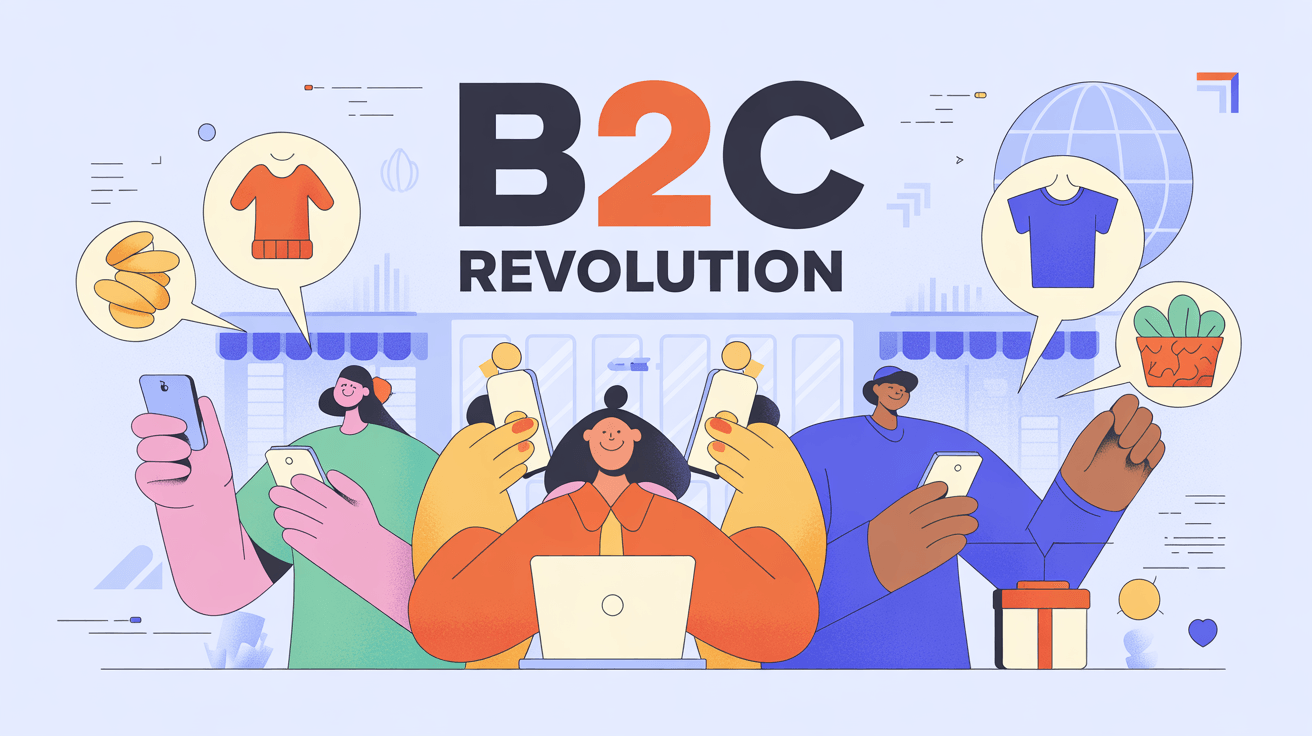SideJober
Archives
Understanding the Business-to-Consumer (B2C) Model and Its Impact
SIGN UP FOR OUR NEWSLETTER
The B2C Revolution: How Selling Directly to Consumers Changed Everything |
The business-to-consumer model has fundamentally reshaped our economy. For entrepreneurs and shoppers alike, this shift from traditional retail to a direct digital marketplace represents a new era of commerce. |
The world of commerce has been completely transformed, and the engine behind this change is a simple but powerful concept: business-to-consumer, or B2C.
It’s the force that allows you to order groceries from your phone, stream movies on demand, and buy products from small makers halfway across the world.
This model is more than just a business term; it's a fundamental shift in the relationship between brands and people.
At its core, the B2C model describes any business that sells products or services directly to individual customers for their personal use.
This might seem obvious today, but it represents a radical departure from the old way of doing things.
A New Path to the Customer
For generations, the path from creation to consumption was long and winding.
A manufacturer made a product, sold it to a wholesaler, who sold it to a retail store, which finally sold it to you.
Each step added cost and created distance between the maker and the end-user.
The rise of e-commerce, pioneered by companies that started as simple online booksellers, shattered that linear model.
Suddenly, businesses could build a digital storefront and reach a global audience 24/7, cutting out the intermediaries entirely.
This direct-to-consumer approach didn't just offer convenience; it often meant lower prices for shoppers, as retailer markups vanished from the equation.
B2C vs. B2B: A Different Conversation
To truly grasp the business-to-consumer landscape, it's crucial to distinguish it from its counterpart, business-to-business (B2B).
While B2C companies speak to individual buyers, B2B firms sell to other companies.
The entire sales process is different.
B2C sales are often driven by emotion, brand appeal, and immediate need.
The sales cycle can be instantaneous, completed with a single tap on a screen.
B2B sales, in contrast, are typically driven by logic, return on investment, and long-term value.
Decisions often require approval from multiple stakeholders, making the sales cycle longer and more complex.
Marketing strategies reflect this divide.
B2C marketing focuses on storytelling, social proof, and creating an emotional connection, whereas B2B marketing traditionally highlights features, data, and efficiency.
The Modern B2C Playbook
The digital age has spawned several distinct B2C models, each offering a unique way to connect with customers.
Direct Sellers: This is the purest form of B2C e-commerce.
From major international brands to local artisans, these businesses sell their own products directly from their own websites or physical stores.
Online Intermediaries: These are the matchmakers of the digital world.
Platforms that aggregate travel deals or curate gift boxes from various brands act as connectors, earning revenue by facilitating transactions between buyers and sellers without owning the inventory themselves.
Advertising-Based Models: This strategy involves attracting a large audience with free content, like news articles, videos, or social media feeds, and then selling access to that audience to advertisers.
Many major social media platforms and digital publishers operate on this B2C model.
Subscription Services: A rapidly growing segment, these fee-based businesses charge customers a recurring fee for access to content or products.
This model turns a one-time purchase into an ongoing relationship, fostering incredible brand loyalty.
The Unmistakable Advantages of Going Direct
For local entrepreneurs and established brands alike, the B2C model offers powerful benefits.
Perhaps the most significant is direct access to customer data.
When you sell directly to customers, you learn who they are, what they like, and how they shop.
This information is invaluable for refining marketing strategies and developing new products.
Furthermore, an online B2C business has a global reach from day one.
A small business in a quiet neighborhood can sell its products to customers across the country or around the world.
This breaks down geographical barriers that once limited growth for countless small businesses.
Navigating the Challenges of the B2C World
Despite its advantages, the B2C path is not without its hurdles.
Competition in the digital marketplace is fierce.
Standing out requires mastering search engine optimization (SEO) and creating a seamless, user-friendly website that builds trust from the first click.
Customer acquisition can be costly, and retaining customers requires a consistent focus on a positive experience, from easy payment processing to responsive customer service.
Consumers today expect a frictionless journey, and any hiccup can send them to a competitor.
The Future is Direct and Personalized
The evolution of the business-to-consumer model is far from over.
Technologies like Artificial Intelligence (AI) are enabling hyper-personalization at a scale never before possible, with brands predicting customer needs before they even arise.
Social commerce continues to blur the lines between content and shopping, allowing users to buy products directly from their social feeds.
Additionally, a growing number of consumers are prioritizing sustainability and ethical practices, pushing B2C brands to be more transparent about their supply chains and values.
The future belongs to brands that can blend technological efficiency with a genuine, human connection.
Ultimately, the B2C revolution has empowered both businesses and consumers, creating a more dynamic, responsive, and direct commercial landscape for everyone.
Business-to-Consumer FAQ
What is the main difference between B2C and B2B models?
The primary difference is the customer. B2C (business-to-consumer) companies sell directly to individuals for personal use, with marketing often focused on emotion and brand. B2B (business-to-business) companies sell to other businesses, with a longer sales cycle based on logic, value, and return on investment.
Why is the business-to-consumer model so effective for online stores?
The B2C model allows online stores to reach a global audience, operate 24/7, and build direct relationships with their customers. By cutting out intermediaries like wholesalers and retailers, they can often offer more competitive pricing and gather valuable customer data to personalize marketing and improve products.
What are some common B2C marketing strategies?
Successful B2C marketing strategies include social media marketing, email marketing, search engine optimization (SEO), influencer marketing, and content marketing. The goal is to build an emotional connection, tell a compelling brand story, and create a seamless customer experience from discovery to purchase. |

